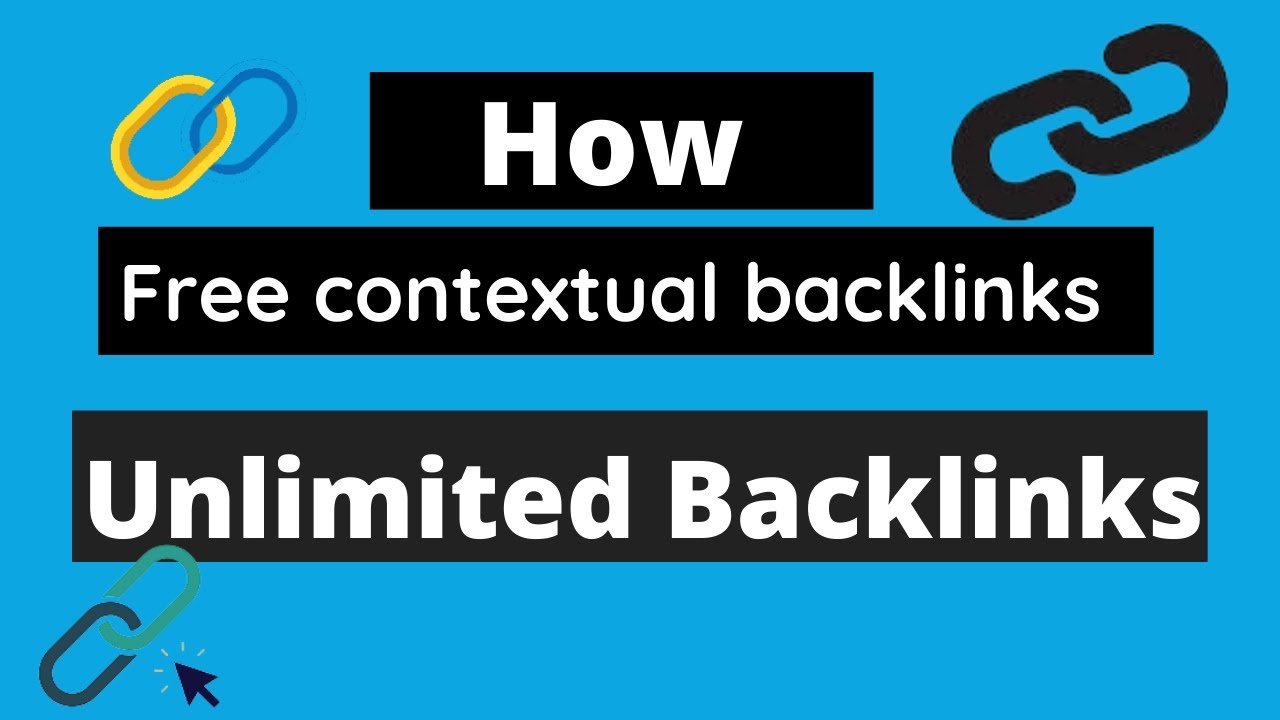If you are running a website or an online business, then you must have heard of the term "Contextual Links." In the world of SEO, these links have become one of the most crucial factors in achieving higher rankings in search engineresults pages (SERPs). But what are contextual links, and how do they work? We will answer all your questions about contextual links and how they can help improve your SEO.
What Are Contextual Links?
Contextual links are hyperlinks within the body of a webpage that point to another webpage. These links are embedded in the contentand are usually surrounded by relevant text that describes the destination webpage's content. In simple terms, contextual links are links that provide additional information or context about the topic being discussed in the content.
The purpose of contextual links is to provide a better user experienceby directing readers to additional relevant content. This, in turn, helps search engines understand the relationship between different webpages and their content. Contextual links also help in building authority and trust for your website, as they provide additional resources for readers to explore.

Why Your Website Desperately Needs Contextual Links
How Do Contextual Links Improve SEO?
Contextual links play a significant role in improving your website's search engine rankings. Here are some ways contextual links can help improve your SEO:
1. Increased Page Authority
When a high-authority website links to your website through a contextual link, it can significantly improve your website's authority. Search engines consider such links as a vote of confidence for your content, and it can lead to an improvement in your search engine rankings.
2. Improved User Experience
As mentioned earlier, contextual links help in providing a better user experience by directing readers to additional relevant content. When users find your content valuable and informative, it can lead to increased engagement, reduced bounce rates, and improved time on site. These factors are essential in determining your website's search engine rankings.
3. Increased Referral Traffic
When a contextual link is placed on a high-traffic website, it can drive significant referral traffic to your website. This traffic can lead to increased conversions and revenue for your online business.
4. Enhanced Relevancy
Contextual links help in establishing the relevancy of your content. When you link to other relevant content within your website, it shows search engines that your website is a valuable resource for users searching for a particular topic.
Types Of Contextual Links
Contextual links can be categorized into two types - Internal Contextual Links and External Contextual Links.
1. Internal Contextual Links
Internal contextual links are links that point to other webpages within your website. These links are essential in helping search engines understand the structure and hierarchyof your website's content. Internal links also help in distributing page authority throughout your website, which can lead to improved rankings for your webpages.
2. External Contextual Links
External contextual links are links that point to webpages outside of your website. These links are essential in building authority and trust for your website. When high-authority websites link to your website through contextual links, it can significantly improve your website's search engine rankings.
5 Best Practices For Contextual Linking
Here are some best practices that you should follow while incorporating contextual links in your content:

Why Contextual Links Matter For SEO | WP Learning Lab
1. Use Relevant Anchor Text
When incorporating contextual links into your content, it is important to use relevant anchor text. Anchor text is the clickable text that appears within the hyperlink, and it provides context to search engines about the content on the linked webpage. By using relevant anchor text, you help search engines understand the relationship between the linked pages. Relevant anchor text also improves the user experience by providing context to the user about the linked content.
For example, if you are writing a blog post about the benefits of green tea, and you want to link to a webpage that sells green tea, using "buy green tea" as the anchor text is more relevant than using "click here."
2. Link To High-Quality Content
When linking to external content, it is important to link to high-quality and authoritative sources. Linking to low-quality or spammy websites can harm your website's credibility and trustworthiness. Linking to high-quality content that provides value to your readers enhances the user experience and establishes your website as a reliable resource for users.
Additionally, linking to high-quality content can increase the chances of the linked website linking back to your website. This can help in building relationships with other websites in your niche, and also improve your website's search engine rankings.
3. Avoid Over-Optimization
While incorporating contextual links, it is important to avoid over-optimization. Over-optimization refers to the practice of using too many links or using the same anchor text repeatedly within your content. This can be seen as a manipulation of search engine rankings and can lead to a penalty by search engines.
Instead, focus on incorporating links naturally within your content. Use links only when they provide additional value to the user, and avoid using links solely for the purpose of increasing your search engine rankings.
4. Use Natural Language
Contextual links should be incorporated in a natural and logical way within your content. Avoid using forced or irrelevant links that do not add any value to the user. Incorporating contextual links in a natural and logical way enhances the user experience and helps in establishing your website as a valuable resource for users.
For example, if you are writing a blog post about the benefits of yoga, it would be natural to link to a webpage that provides more information about a specific yoga pose. However, linking to a webpage about the history of coffee would not be relevant or natural.
5. Use A Mix Of Internal And External Contextual Links
It is important to use a mix of internal and external contextual links within your content. Internal links help in distributing page authority throughout your website, and also helps in establishing relationships between different pages on your website. External links, on the other hand, help in building authority and trust for your website.
By using a mix of internal and external links, you enhance the user experience by providing additional value and information to the user. Additionally, using a mix of internal and external links can help in improving your website's search engine rankings by increasing the relevancy and authority of your website.
Is It A Google Ranking Factor?
Yes, contextual links are a Google ranking factor. Google considers contextual links as a way to measure the quality and relevance of a webpage. When a webpage is linked to from another webpage, search engines consider it as a vote of confidence for the linked webpage. However, not all links are created equal.
Google looks for natural and relevant links that provide additional information and value to the user. Contextual links, which are placed within the content of a webpage and surrounded by relevant text, are considered to be more valuable than links placed in other parts of a webpage, such as the footer or sidebar.
Google's algorithm uses various factors to determine the relevance and quality of a webpage, and contextual links play a significant role in this process. The anchor text used in the contextual link, the surrounding text, and the authority of the linking webpage are all considered by Google when determining the value of a contextual link.
It is essential to note that while contextual links are a ranking factor, they are not the only factor that determines a webpage's search engine rankings. Other factors, such as content quality, page load speed, mobile-friendliness, and user experience, also play a crucial role in determining a webpage's ranking on search engine result pages (SERPs).
In summary, contextual links are a crucial aspect of SEO and a Google ranking factor. Incorporating relevant and natural contextual links within your content can help improve your webpage's search engine rankings, increase referral traffic, and enhance the user experience.

How To Create contextual backlinks| What is Contextual Backlinks
People Also Ask
What Is The Difference Between Contextual Links And Anchor Text Links?
Contextual links are hyperlinks within the body of a webpage that points to another webpage, and they are usually surrounded by relevant text that describes the destination webpage's content. Anchor text links, on the other hand, are hyperlinks that use specific keywords as clickable text. While anchor text links can help in improving your search engine rankings, over-optimization of anchor text links can lead to a penalty by search engines.
How Many Contextual Links Should I Use In My Content?
The number of contextual links you use in your content depends on the length and type of content. However, as a general rule, you should use 2-3 contextual links for every 500 words of content.
Can I Use The Same Anchor Text For Multiple Contextual Links?
While it is not recommended to use the same anchor text for multiple contextual links, it is not a violation of any search engine guidelines. However, using the same anchor text repeatedly can lead to over-optimization, which can negatively impact your search engine rankings.
Can I Buy Contextual Links For My Website?
Buying contextual links for your website is a violation of search engine guidelines and can lead to a penalty by search engines. It is essential to build contextual links organically through high-quality content and natural outreach.
Conclusion
In conclusion, contextual links are an essential aspect of SEO that can help in improving your website's search engine rankings. Contextual links provide additional information and context about the topic being discussed in the content, which helps search engines understand the relationship between different webpages and their content.
Incorporating contextual links in your content using best practices can lead to increased page authority, improved user experience, increased referral traffic, and enhanced relevancy. It is essential to use a mix of internal and external contextual links and avoid over-optimization to achieve the best results.